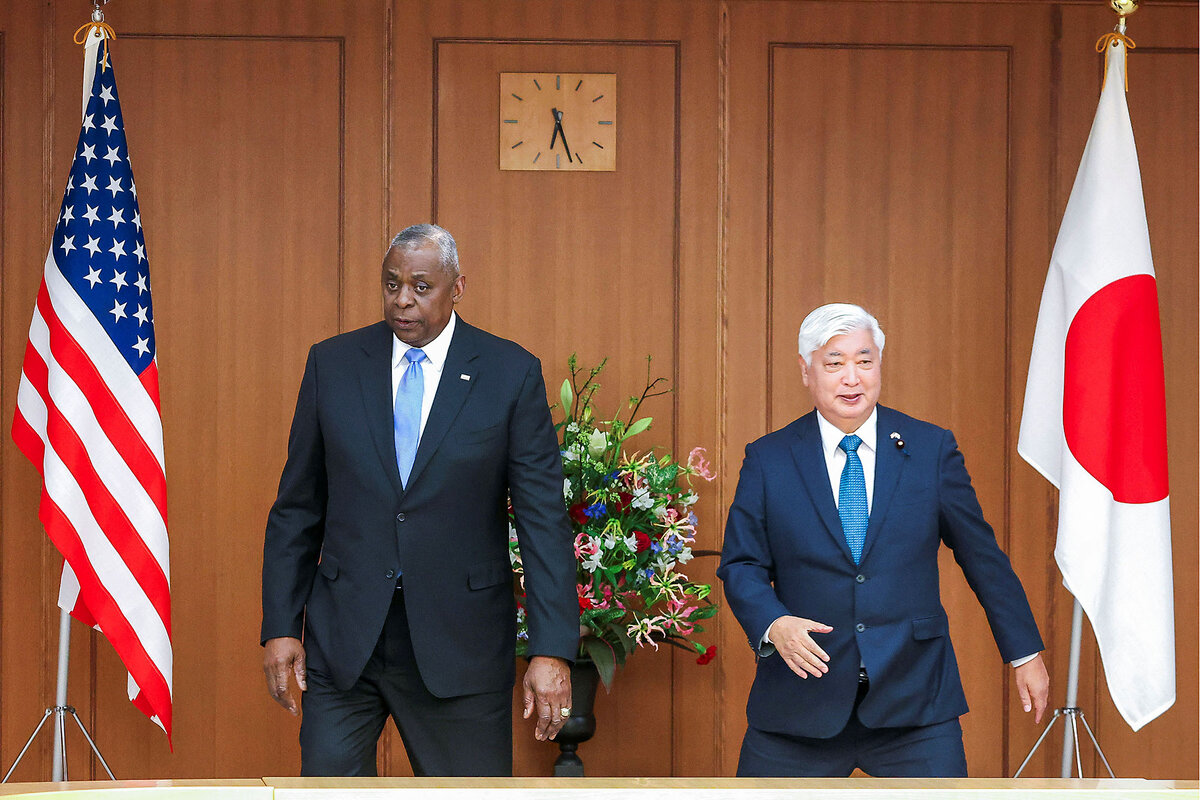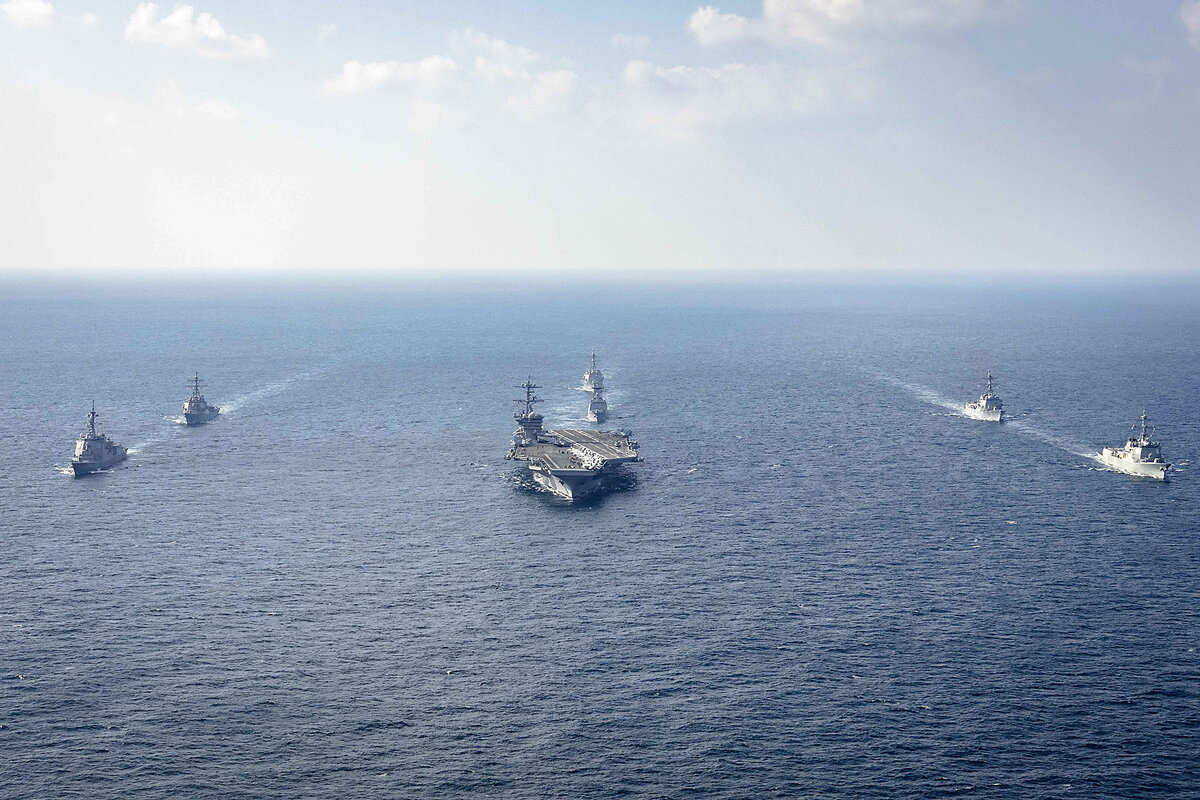In ‘new crisis era,’ Tokyo needs help from Seoul and DC. Can it count on them?
Loading...
| Tokyo
From the top floors of Japan’s Defense Ministry headquarters, the view of East Asian security is increasingly dire, adding urgency to Tokyo’s goal of strengthening the U.S.-Japan-South Korea alliance despite ongoing political upheaval in Seoul.
Scores of Chinese warships and aircraft are fanning out this week around Japan, South Korea, Taiwan, and the South China Sea as part of a massive Chinese military exercise. Russian ships, in an apparently coordinated move, are plowing waters near South Korea and Japan.
North Korea, meanwhile, has been stepping up missile launches in recent months, firing one in October that landed off the coast of Japan’s northern island of Hokkaido.
Why We Wrote This
As security threats mount in the Asia-Pacific, the hard-won defense alliance between Japan and South Korea is the linchpin to regional safety. Now, political upheaval in Seoul threatens to test the partnership’s resilience.
“We are getting into a new crisis era,” says a Japanese Defense Ministry official, speaking on the condition of anonymity, per the ministry’s press policy. She describes the country’s security environment as “the biggest challenge since World War II.”
Japan’s military cannot face these threats alone – a point stressed by Japanese Defense Minister Nakatani Gen on Tuesday when he told visiting U.S. Defense Secretary Lloyd Austin that they need to boost “alliance capabilities to deter and respond” to the “increasingly severe” security challenges.
At the center of this alliance is the historically fraught relationship between Japan and South Korea. Over the past two years, Japan and the United States have made major strides in the trilateral defense relationship with South Korea. But whether that progress can continue has been thrown into question by the political crisis in Seoul, ignited by President Yoon Suk Yeol’s bungled attempt to impose martial law last week.
South Korea’s alliance with Japan and the U.S. “is already a very challenging issue,” says retired South Korean army Lt. Gen. In-Bum Chun. “If Yoon goes down, it will get worse, which is going to be a real shame.”
Building up Japan-South Korea cooperation
Mr. Yoon, a conservative elected in 2022, helped bring about a dramatic improvement in South Korea’s ties with Japan, which had plunged to their lowest point in decades as a result of historical disputes over Japan’s 1910-1945 colonial rule of the Korean Peninsula.
Ties were so strained, for example, that in 2018 Japan’s Defense Ministry charged that a South Korean navy destroyer directed a targeting radar system at Japanese military patrol aircraft, charges that South Korea denied.
Mr. Yoon put these tensions squarely in the rearview mirror, saying in 2023 that Japan had “transformed from a militaristic aggressor of the past into a partner.” Mr. Yoon and then-Japanese Prime Minister Kishida Fumio, a fellow conservative, launched the two nations into military cooperation including joint anti-submarine warfare exercises and ballistic missile defense drills.
In June this year, Seoul and Tokyo normalized defense relations, and in July, together with Washington, they signed a memorandum to institutionalize their defense ties in a bid to lock in policy talks, joint training exercises, and information sharing on ballistic missiles. In part, the agreement was meant to sustain ties despite “ups and downs in the political situation in each of the three countries,” says a second Japanese defense official.
In November, Mr. Nakatani became the first Japanese defense minister to board a South Korean warship, when the ship made a port call in Yokosuka, Japan. He was reportedly scheduled to visit South Korea later this month – the first Japanese defense minister to do so in nine years – but the ongoing political crisis has complicated these plans.
“Strange Japan-centered foreign policy”
As police investigate whether Mr. Yoon’s martial law decree constituted an insurrection, judicial authorities have barred the president from leaving the country. Mr. Nakatani’s counterpart, former Defense Minister Kim Yong-hyun, resigned last week for his role in the martial law decision and was arrested. On Tuesday he reportedly attempted suicide in jail.
A coalition of South Korean opposition parties is now working to impeach Mr. Yoon, arguing in part that he endangered South Korea by improving relations with Japan. The impeachment motion states that Mr. Yoon “has antagonized North Korea, China, and Russia, [and] insisted on a strange Japan-centered foreign policy ... inviting isolation in Northeast Asia and triggering the crisis of war.”
If Mr. Yoon is forced from office or steps down, and the center-left opposition gains power, ties with Japan could suffer, say defense experts in both countries. “If the people choose a left-wing Cabinet that is pro-North Korea, that would be very, very difficult,” says a senior Japanese Defense Ministry adviser.
Meanwhile, Japan’s relationship with the U.S. – which has often acted as a stabilizing intermediary between Tokyo and Seoul – becomes all the more important, despite Washington facing its own political turnover in January.
Secretary Austin, visiting U.S. forces based in Japan this week to hear about efforts to modernize command and control between the two militaries, emphasized that the U.S.-Japan alliance is stronger than ever.
“America’s extended deterrence commitment to Japan and the Republic of Korea is ironclad,” Secretary Austin said, pledging the U.S. will advance the “historic” trilateral cooperation with South Korea.
At the bustling Defense Ministry in Tokyo, eight television screens broadcast different news channels above an open office. Officials here say Japan is prioritizing its relationship with the U.S., but wants to build upon ties with South Korea when possible. “We can’t control the South Korean domestic situation – we can watch carefully and cooperate with the U.S.,” says the Defense Ministry adviser.








